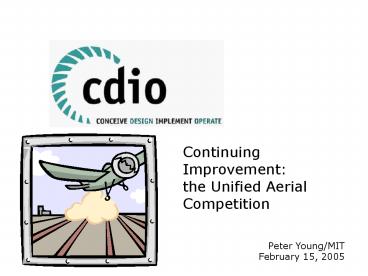Continuing Improvement: PowerPoint PPT Presentation
1 / 12
Title: Continuing Improvement:
1
Continuing Improvement the Unified Aerial
Competition Peter Young/MIT February 15,
2005
2
Overview
- The Unified Aerial Competition
- Background
- Reasons for change (Spring 2005)
- Conclusions
3
Background
- Unified Engineering
- Core engineering course, MIT sophomore students
- Annual class size 65
- 5 disciplines taught, 2 courses/term, Fall and
Spring - - Structures/Materials, Computers/Programming,
Signals, - Fluids/Propulsion, Systems
- Pedagogical features
- Active learning techniques
- Individual Infra-Red response transmitters
- Work in teams
- Hands on, heads on lab/workspace experiences
4
Unified Aerial Competition, background
- - Spring 1998 design/build/fly event initiated
to provide a CDIO flight experience - - Basic elements
- Fundamentals of aeronautics taught via lectures,
problem sets - Electric powered radio controlled airplanes used
to provide concrete flight experiences with
flights indoors - Initial aircraft designs 100 original designs
- Extremely low of successful flights
5
UAC program evolution
- Event objectives initially tried
- Air-ground observation using small wireless
cameras - Maximum velocity difference, maximum vs. minimum
- Timed laps around pylons (pylon racing
- Timed out of a box assembly and flight
- Problems/issues
- Overcomplex tasks
- Minimal opportunities to flight-test and practice
- Very challenging piloting experience flying
indoors - Above event objectives subsequently discontinued!
6
Revised UAC performance criteria, Spring 2001
- Students event objective
- Modify a stock airplane design to achieve better
performance through a combination of design,
analysis, build, and test - Key enabling features
- flight simulator training
- early success pre-assembled aircraft and
radios for initial flight training - students completion and flight of basic stock
kit early in term - subsequent design by redesign of stock kit.
7
Unmodified Dragonfly electric radio-control
aircraft
Solid Styrofoam wing, 1.2 m span
100 watt electric motor
Radio control equipment,rechargeable battery
8
New UAC flight objectives (2001)
- Explicit objective
- Modify the aircraft design for maximum endurance
with a limited battery size (350 mah) - Implicit objectives
- Design for minimum drag
- Minimize structural weight
- Optimize motor/propeller for minimum
- current drain
- Minimize influence of piloting skill
- flight duration important, not flight path
9
A typical modified UAC entry
CNC-cut foam wing, new wing planform and
different airfoil
Minimally modified fuselage
Resized tail surfaces
10
Spring 2005 UAC reasons for change
- Stronger linkages desired between curricular
deliverables (problem sets) and final flight
performance - Final aircraft designs often not as analyzed
designs - Maximum flight time not robustly linked to
design and analysis - Flight time effectively the only performance
metric - Common syndrome end-of-term cut and try design
changes
11
Spring 2005 UAC implementing change
- Problem sets redesigned to strengthen linkages
between design processes and final product - Configuration baselines to be established
- Baseline changes justified and documented
- Final flight objectives
- Unchanged maximum flight time with limited
battery packs - Digital flight recorders to be installed and
flown - Allows in-flight measurements of key parameters
- Engine speed, current drain, voltage, derived
velocity
12
Unified Aerial Competition Summary
- Design/build/fly event formulated to merge
classroom theory with teamwork, actual flying
experiences - 2001 revision to flight objectives substantial
improvement - 2005 revisions to pedagogy and flight procedures
- further improvements?
- to be reported in June!

